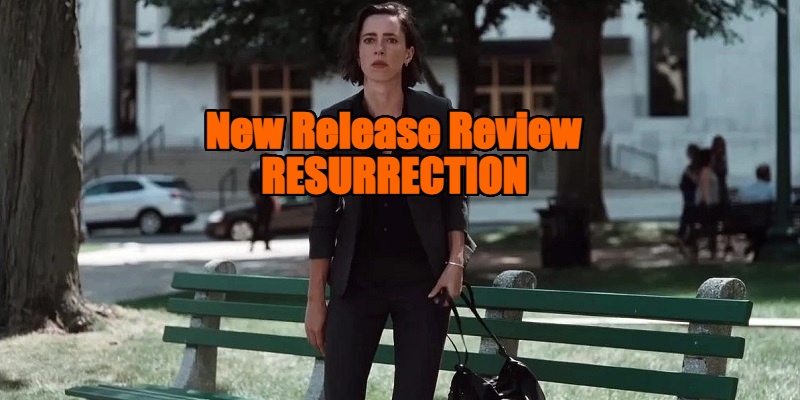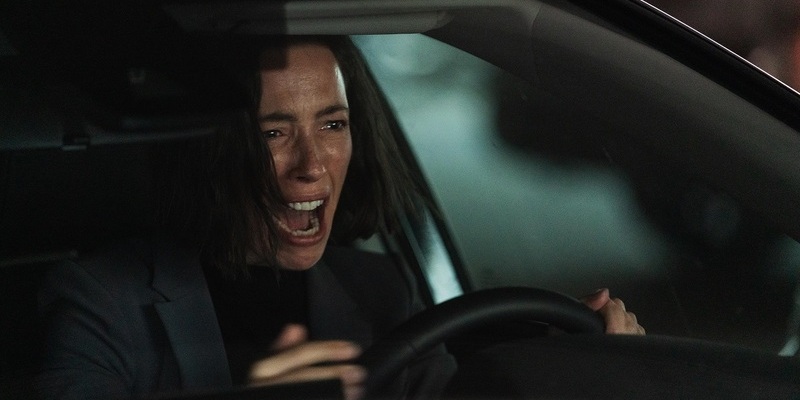
Review by
Ren Zelen
Directed by: Andrew Semans
Starring: Rebecca Hall, Tim Roth, Grace Kaufman, Angela Wong Carbone, Josh Drennen,
Michael Esper

Margaret (Rebecca Hall) is a successful businesswoman and single
mother of a teenage daughter. She has a nice apartment and a calm daily
routine including a bout of intense running to keep fit. At work she is
leader of her team and a wise and trusted confidante for the romantic
difficulties of her young female employees.
She’s also having an affair with Peter (Michael Esper), one of
her married co-workers. It’s a sexually charged but undemanding
relationship where Margaret can chat quite happily about Peter’s family
after they’ve had sex. She feels free to organize her life as she likes
- it is structured, regular, contented, and her daughter Abbie, (Grace Kaufman) is the centre of her world.
One day, while at a dull business conference, Margaret’s attention
wanders and she begins to casually look around at her fellow attendees
and sees the profile of a man, several rows away. It is then that all
her self-possession and assurance shockingly fall away and she flees
from the venue in the throes of a full-on panic attack.

Clearly it is a man that she recognises and from that moment on, she
doesn’t have a moment’s peace of mind. She becomes fearful for her
safety and that of her daughter, of whom she is fiercely protective.
Soon, she sees the man casually strolling around a store where she is
shopping with Abbie, and later, she spots him sitting across the lawn in
a nearby park, reading a newspaper. Mentally shaken and getting to the
end of her tether, Margaret decides to confront him.
He is a man from her past called David and a weird conversation ensues.
Margaret demands that he goes away and leaves her alone, and after a few
moments of apparent ingenuousness, he calls her by her name and
cryptically responds that he "still has Ben."
Andrew Semans’ second feature Resurrection is a
film which unravels its mysteries slowly, inviting the audience to ask
who is David? Who is Ben? Why do they hold such terror for a seemingly
self-assured and powerful forty-something career-woman like Margaret?
Margaret goes to the police, but of course, they can’t help her as David
is too clever to do anything overt and she has approached him first. We
witness Margaret’s growing panic as she tries to keep David from
encroaching further into her life.
To the bemusement of her daughter and her colleagues, Margaret suddenly
seems like another person – distracted, frantic, paranoid and even
aggressive. She fits more sturdy locks on her doors and demands that
Abbie stays in their apartment and does not leave or answer the door for
any reason.

Determined to protect her child, yet refusing to share the reason for
her fear, Margaret reassures her daughter, "Don’t be scared," but what
is really frightening Abbie is her mother’s unexplained, overpowering
panic.
Margaret begins to behave erratically in the office, worrying Peter by
her strange, nervy behaviour. Whatever David represents, it’s something
so disturbing that Margaret retreats from the confident and capable
businesswoman she once was, becoming haggard and withdrawn. She begins
to alienate those around her who try to help.
As David chips away at the secure life and personality Margaret has
created for herself, alternating between professed affection and veiled
threats against her and her daughter, her reality and sanity begin to
fall apart. Her biggest dread is losing Abbie, but she is soon on the
way to doing exactly that.
Ominously relevant was Margaret’s advice to a young female employee in
the first scene when warning her of a toxic relationship, as she
declared, "a sadist never understands why others aren’t enjoying the
sadism as much as they are."
It's telling that the same young colleague witnesses Margaret’s own
confession of abuse and manipulation at the hands of a sadist (a
compelling monologue from Hall) and has no idea what to do with that
information. She slinks away, confused as to how to react when faced
with the trauma and weakness of her erstwhile idol.

Tim Roth’s David is a movie monster of the most sinister kind,
presenting a reasonable face, professing understanding and affection for
his victim, while demanding she offer "kindnesses" to him - painful
feats of physical hardship and endurance, to atone for her unreasonable
and recalcitrant behaviour. He’s a manipulative and sadistic abuser, who
also tortures Margaret psychologically with an unhinged story concerning
a particular trauma in their shared past.
It's this which finally sends Margaret over the edge and creates a
bloody and bizarre denouement which leaves us all off-balance and unsure
as to who or what to believe.
Resurrection offers another arena for the talent of Hall.
In films like
Christine
and
The Night House
(both premiered at Sundance, as did her directorial debut
Passing), she has demonstrated a gift for playing characters in emotionally
extreme situations. Resurrection explores the themes of
guilt, manipulation, motherhood, abuse, trauma and co-dependence.
Matched by Roth at his most menacing, Hall again gives an
uncompromising, compelling performance which raises the caliber of every
film in which she appears.

Resurrection is on UK/ROI VOD
from December 5th.

